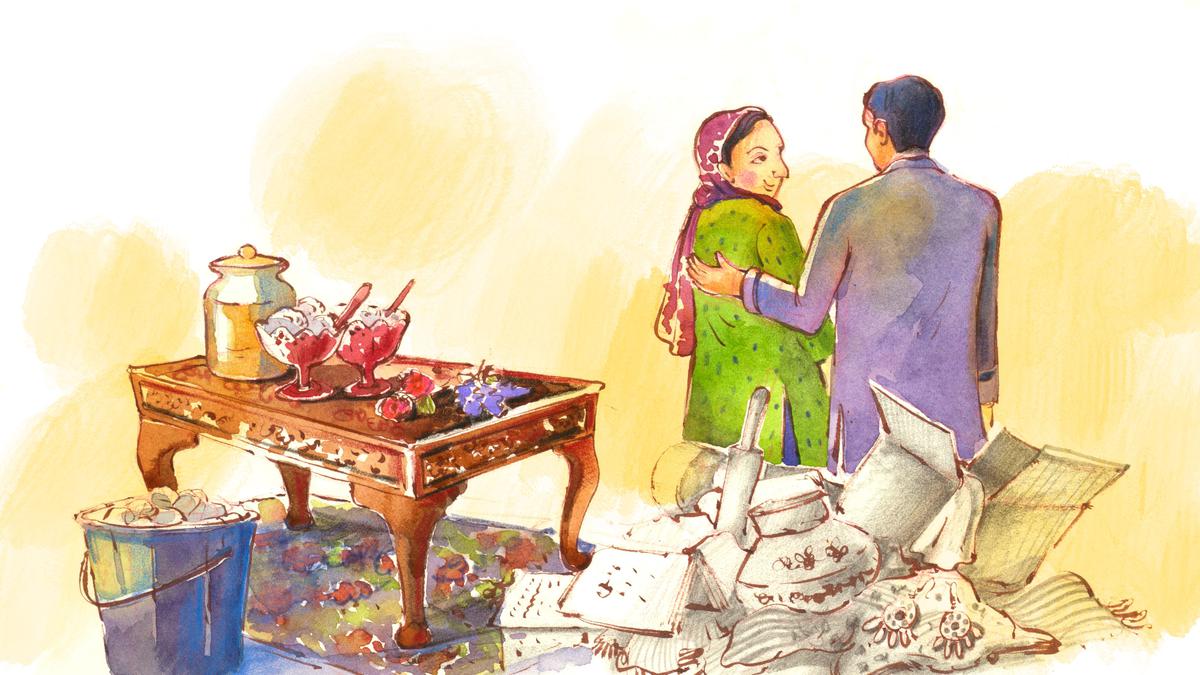A young woman named Haneefa lived in Phuphee’s village. She was a gentle mannered girl who excelled at everything she did. After she started working as a teacher in the local school, a marriage was organised. The groom, too, was a teacher and lived in the same village.
Her marriage took place on a beautiful day in June. Everyone talked about how pretty the bride looked, how dashing the groom was, and how delicious the wedding feast had been, but a week later all hell broke loose.
The word around the village was that one morning, a few days after her marriage, Haneefa had left her in-laws’ house without telling anyone, gone into town and bought all manner of things they didn’t need — utensils, clothes, jewellery, new bedding. She had spent an exorbitant amount of money. And she hadn’t stopped there. It had carried on the next day and the next.
In between, she had gotten angry when confronted by her husband and proceeded to trash the whole house and tried to beat him with a copper pot she had just bought. The whole family was in a state of shock, and had sent her back to her parents.
Her parents were beside themselves with worry because Haneefa had always been gentle and well behaved. It was finally concluded that someone had put a curse on her and she had been possessed by an evil spirit. She was labelled as being mad. Haneefa’s parents took her to the local medicine man and all the famous peers (faith healers), but she remained as she was. When everything else failed, they brought her to Phuphee.
Phuphee had known Haneefa for a long time. She took the girl into her room and closed the door. Every once in a while, I would go and stand outside but all I could hear were sobs. On the second day, Dr. Hameed arrived. I don’t know what his speciality was, but I knew Phuphee relied on him a great deal. He stayed an hour or so and then left. Haneefa stayed confined to the room for nearly two weeks. One day after school, I saw Haneefa watering the plants in the kitchen garden. She didn’t speak but she seemed more like the person we had all known.
A few days later, Phuphee asked her parents to come and see her. They were happy that their daughter seemed to be doing well, but they were heartbroken too because Haneefa’s husband had asked for a divorce. Her in-laws had accused the family of hiding the curse on their daughter. Phuphee told them not to worry and let Haneefa stay with her a few more days.
The next day, early in the morning, I saw Phuphee making a gulkand (rose petal jam) lavender ice cream. She had secured some ice from the local ice cream walaa. When she was done, she let me lick the spoon and the bowl and said, ‘Remember, gulkand sweetens even a bitter soul and lavender clears the clouded mind.’
Later that day, I saw Haneefa’s husband at the house. When Phuphee went to greet him, she took some of the ice cream with her and shut the door behind her. The next day, Haneefa returned to her in-laws’ home. I asked Phuphee what magic words she had used. She replied with silence. I was nearly 13 at the time. I asked her repeatedly over the years about what she had done because once Haneefa went back, we never heard of anything going wrong again.
It wasn’t till I was nearly 22 and at medical school that Phuphee told me about what she had really done. I was talking to her on the phone when I remembered Haneefa and her temporary madness. I heard Phuphee take a couple of deep drags of her cigarettes and then she said, ‘Haneefa didn’t have a spiritual problem, she had a medical one. She had a condition called bipolar. Do you know what that is?’
‘Of course I know what that is. But how did you know that was what it was?’
‘Because I have it, too. I have had it for a very long time. It reared its head just after I got married, but my friend maetonji [the English missionary nurse in the village] helped me. Dr. Hameed treated me and I got better. Sometimes, I still become unwell, but Dr. Hameed always helps me get through it along with your uncle,’ she replied.
I was too stunned to speak. I had known Phuphee all my life, but never once had I suspected that something was not right.
‘Does Haneefa’s husband know?’ I asked.
‘Yes, I told him. I told him about my condition and how I manage it. How I take medication everyday and that Haneefa would have to do the same. He took it very well. In fact, he seemed relieved that it was medical rather than spiritual,’ she said. I could hear her smile as she said the last sentence.
‘Why didn’t you tell me before?’ I asked.
‘You were too young.’
Neither of us spoke. I felt both privileged and relieved, a weird sort of mix, much like the gulkand lavender ice cream she used to make. Privileged because she finally felt she could trust me with something so deep and personal, and relieved that she had chosen not to tell me back then.
Saba Mahjoor, a Kashmiri living in England, spends her scant free time contemplating life’s vagaries.

